Leading in a crisis: how one Fellowship Alumnus led his team to success during the COVID-19 pandemic
Since the beginning of the COVID-19 pandemic, companies and organizations worldwide have adopted creative strategies to keep their enterprises afloat. For companies in fragile economies, staying relevant amid the current crisis is even more crucial.
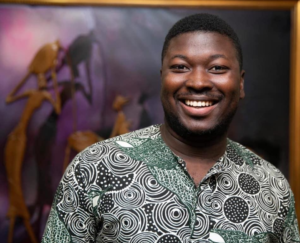
In April 2020, Dr. Laud Anthony Basing, a 2016 Fellowship Alumnus from Ghana, led his team at Incas Diagnostics, in partnership with Kwame Nkrumah University of Science and Technology (KNUST), to develop a rapid diagnostic test for COVID-19. This bold move helped his company succeed and holds valuable lessons for leaders and Fellowship Alumni navigating the current public health crisis.
From side project to business strategy
When Laud first came to the United States in 2016 for the Mandela Washington Fellowship, his company Incas Diagnostics was a social enterprise that provided affordable laboratory services for people in Kumasi, Ghana.
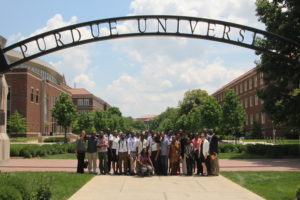
“I was developing molecular fluid test kits before the Fellowship,” he says, “but it was mainly a hobby and an academic interest of mine.”
During his Leadership in Business Institute at Purdue University, Laud went through the Purdue Foundry LaunchBox curriculum, which helps entrepreneurs develop their ideas into full-fledged business models. He realized, with the encouragement of other Fellows and Purdue faculty, that his side project could become a real business.
After Laud returned home to Ghana in August 2016, he worked with his team to realize the new direction of Incas Diagnostics. Later that year, he had the opportunity to work with Dr. Jacqueline Linnes on an HIV molecular fluid kit at the Linnes Lab at Purdue.
Laud spent two years collaborating with Dr. Linnes, honing his test kit-making skills and developing a kit for yaws, a common bacterial infection of the skin, bones, and joints found in tropical regions around the world. Laud’s test kit was among the top 30 finalists in the World Health Organization’s (WHO) Innovation Challenge in 2019. He has applied these same skills to develop other innovations at Incas Diagnostics.
Learning to lead a successful company
Beyond technical skills, Laud found that leadership lessons from his Fellowship in the United States have been essential to managing his team at Incas Diagnostics. One crucial lesson was the importance of diversity.
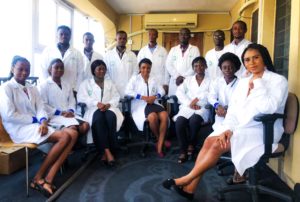
“When I arrived at Purdue [for the Fellowship], I immediately noticed the 50-50 gender split between women and men, the number of countries represented, and the other ways that the cohort was different from each other,” says Laud. “I saw how the many different opinions and backgrounds made us stronger as a group… As I started to grow Incas Diagnostics, I tried to apply the same principles so that our staff would grow together too.”
He has also applied leadership skills to planning, business development, and more.
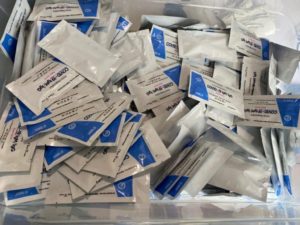
“Every month, we have a ‘strategic doing’ session, where I share my vision and we brainstorm next steps for a project or new work,” he says. “This has helped everyone in the company understand how their work contributes and generates new ideas.”
Laud credits these sessions with helping the company move forward amid COVID-19. It was during one of these strategy sessions that the Incas team came up with the idea to develop a rapid diagnostic test. With the support of KNUST, the Ghanaian Ministry of Health, and the President of Ghana, Laud was able to lead his team to develop the test on a tight timeline and help the company succeed.
Applying leadership lessons in a crisis
If there is one piece of advice that Laud has for leaders during this unprecedented time, it is to be transparent: “When a leader is forthcoming and tells people the truth about a situation, people will gravitate toward that leader and follow them.”
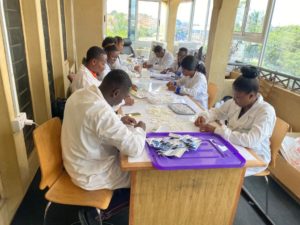
The value of transparency holds true for both political and business leaders. At Incas Diagnostics, Laud knew that the team would need to be creative to help the company survive during the current crisis. Several members of the team suggested reducing pay as a part of austerity measures, but Laud was hesitant.
“People are an important part of the company, not just a means to an end,” Laud says. “I’m glad we were able to find other ways to stay afloat.”
He also encourages people to rely on their networks and teams in tough times. The Mandela Washington Fellowship Alumni Network in Ghana is a close-knit group, and Laud credits them with keeping his spirits up during this challenging period.
Ultimately, Laud urges people to remember what can be accomplished by working together, particularly during a crisis: “Everything I have achieved is because of my team; I did not do it alone.”
This story is part of an ongoing series highlighting Fellowship Alumni who are working to prevent the spread of COVID-19 in their countries.
Written by Meredith Lopez.
Next Story
Grace Jerry
2015 Fellowship Alumni, Nigeria